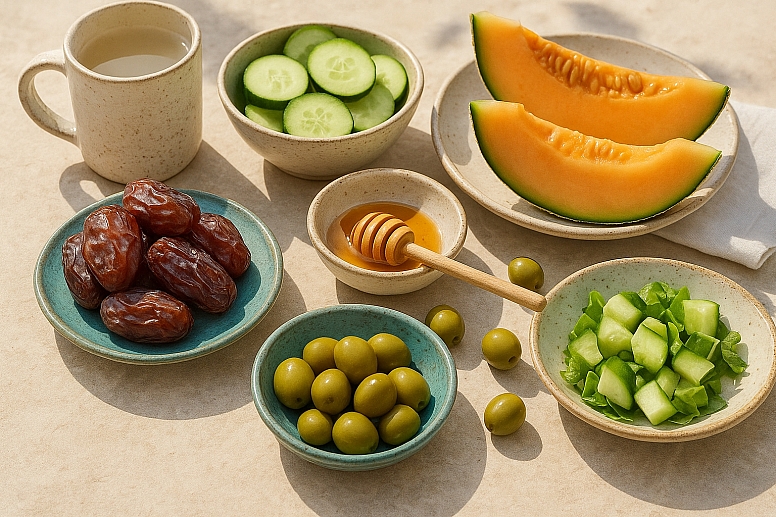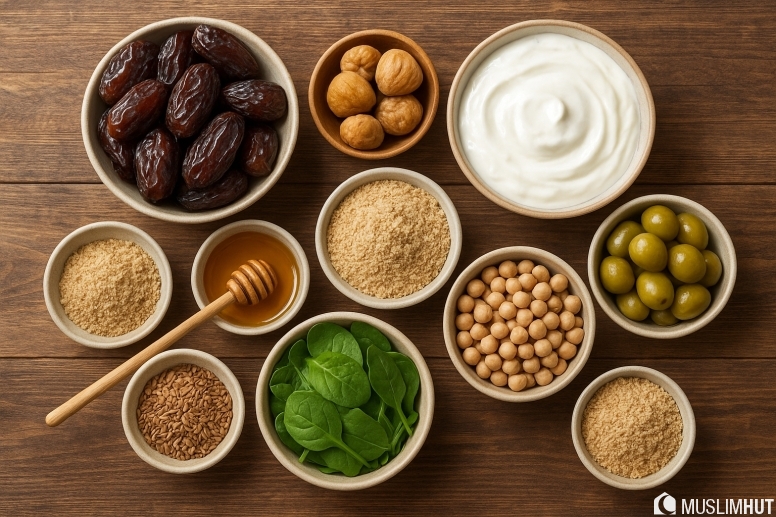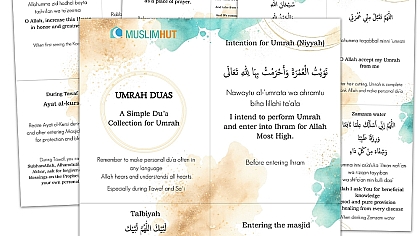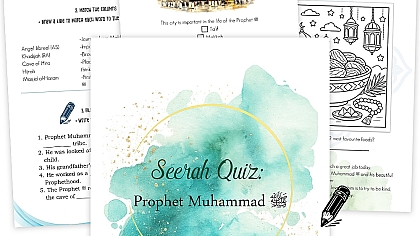
7 Sunnah Foods for a Healthy Gut: Boost Your Digestion the Islamic Way
Your gut is like a garden. To make it healthy, you need to plant good seeds and give it clean water. In Islam, we have a perfect guide for life, and this includes what we eat. The Prophet Muhammad (Sallallahu Alaihi Wasallam) ate certain foods that were simple, pure, and powerful. These foods are called Sunnah foods. They not only fill your stomach but also help your digestion work smoothly. This means fewer tummy aches, more energy, and a stronger body.
What You Will Learn:
- The seven best Sunnah foods for a happy, healthy gut.
- How each food simply helps your digestion.
- Easy tips to add these foods to your meals every day.
- The Islamic rules for eating support gut health.
Why Your Gut Health Matters
Think of your digestive system as a long tube from your mouth to your stomach and intestines. This tube breaks down the food you eat. Your body takes the good parts for energy and gets rid of the waste. Trillions of tiny bacteria live in your gut. Some are good, and some are bad. When you have more good bacteria, your digestion is strong. You feel light and energetic. When bad bacteria take over, you can feel bloated, tired, or sick.
The Sunnah way of eating naturally helps the good bacteria grow. It is a natural path to a healthy gut.
The Prophetic Diet: A Blueprint for Wellness
Long before scientists studied gut health, the Prophet (Sallallahu Alaihi Wasallam) showed us how to eat. His diet was simple and mindful. He never overate. He often said that filling your stomach with too much food makes you sick. He taught us to fill one-third of our stomach with food, one-third with water, and leave one-third empty for easy breathing. This alone is a powerful rule for good digestion. Overeating strains your gut and makes it slow.
He also enjoyed specific foods that are superfoods for our digestive system.
The 7 Sunnah Superfoods for Your Gut
Here are seven foods the Prophet (Sallallahu Alaihi Wasallam) ate that are excellent for your gut health.
1. Dates (Tamr)
The Prophet (Sallallahu Alaihi Wasallam) often broke his fast with dates. This is a great habit for your gut.
- How it helps your gut: Dates are full of a fiber called soluble fiber. This type of fiber soaks up water in your gut. It makes waste softer and helps it move through your body easily, preventing constipation. They also give a quick energy boost without upsetting your stomach.
- How to eat them: Eat 1-3 dates before your meal or as a sweet snack. You can also chop them up and put them on your oatmeal or in smoothies.
2. Olives (Zaitun) and Olive Oil
The Prophet (Sallallahu Alaihi Wasallam) said, “Eat olive oil and use it on your skin, for it comes from a blessed tree.”
- How it helps your gut: Olive oil helps your body absorb vitamins from other foods. It also helps reduce swelling in the gut. This can calm down a sore stomach and make digestion more comfortable.
- How to eat it: Use extra virgin olive oil as a dressing for salads. Dip your bread in it. Use it for light cooking instead of other fats.
3. Honey (Asal)
The Quran calls honey a “healing for men.” The Prophet (Sallallahu Alaihi Wasallam) loved honey for its sweetness and health benefits.
- How it helps your gut: Honey has special powers to fight bad bacteria in the gut. It acts as a prebiotic, which is food for the good bacteria in your stomach. When the good bacteria are happy, they help you digest food and protect you from germs.
- How to eat it: Add a spoonful to warm water or herbal tea. Drizzle it on yogurt or toast. Remember, it is still a sugar, so a little is enough.
4. Black Seed (Habbatussauda)
The Prophet (Sallallahu Alaihi Wasallam) said, “This black seed is a healing for every disease except death.” This shows us how powerful it is.
- How it helps your gut: Black seed oil is very strong at reducing inflammation. It can help with stomach cramps, bloating, and gas. It helps calm an upset digestive system.
- How to eat it: This has a strong, spicy taste. Start with a tiny amount. You can take half a teaspoon of black seed oil or mix a few whole seeds into your bread or curry.
5. Barley (Sha’ir)
The Prophet (Sallallahu Alaihi Wasallam) used barley in his meals, especially when he needed strength or when someone was sick.
- How it helps your gut: Barley is a champion of fiber. It is packed with a type of fiber that makes you feel full and acts like a broom for your intestines, sweeping out waste. This keeps your digestive system very clean.
- How to eat it: You can find barley soup (known as Talbina) in many Islamic cultures. You can also use barley flour to make bread or add cooked barley to stews.
6. Cucumber (Qiththa)
The Prophet (Sallallahu Alaihi Wasallam) enjoyed eating fresh cucumbers, often with dates.
- How it helps your gut: Cucumbers are mostly water. Eating them helps you stay hydrated. Water is essential for moving fiber through your digestive system and preventing blockages. They are very cooling and easy on the stomach.
- How to eat it: Eat them raw as a snack. Add them to salads or make a refreshing yogurt and cucumber dip (like Raita).
7. Melon (Battikh)
The Prophet (Sallallahu Alaihi Wasallam) was reported to eat melon, which includes fruits like watermelon and cantaloupe.
- How it helps your gut: Like cucumbers, melons are full of water and fiber. This combination helps hydrate the body and add bulk to stool, making it easier to pass. They are a delicious and gentle way to help your digestion.
- How to eat it: Enjoy fresh slices of melon as a dessert or a light snack. It’s best to eat melon on its own or before a meal for easy digestion.
Bringing It All Together: A Sample Day

You don’t need to eat all seven foods at once. Here is an easy way to include them in one day.
- Morning: Start with a glass of warm water and honey.
- Breakfast: A bowl of oatmeal with chopped dates and a sprinkle of black seeds.
- Lunch: A salad with olive oil dressing. Have a side of barley soup.
- Snack: Cucumber sticks and a slice of melon.
- Dinner: A normal meal, but remember the one-third rule.
- Before bed: A teaspoon of black seed oil or a cup of tea with honey.
Sunnah Eating Habits for a Strong Digestive System
The foods are important, but how you eat is just as crucial. The Prophet (Sallallahu Alaihi Wasallam) taught us manners that are perfect for gut health.
- Eat with Your Right Hand: This is a slow and mindful way to eat. Eating slowly helps you chew your food properly, which is the first step of digestion.
- Don't Overfill Your Plate: This stops you from overeating. A full stomach cannot digest food well.
- Share Your Food: Sharing a meal is a blessed act. It also often leads to a more varied diet, which is good for your gut bacteria.
- Express Gratitude: Saying "Bismillah" (In the name of Allah) before you start reminds you to be thankful for the food. This puts your body in a relaxed state, which is the best state for digestion.
Your Gut-Friendly Sunnah Journey Starts Now
You do not need to make big, scary changes. The path to a healthier gut is found in the simple, blessed habits of the Prophet Muhammad (Sallallahu Alaihi Wasallam). Start with one thing. Maybe this week, you decide to break your fast with dates. Or you swap your cooking oil for olive oil.
These small steps are acts of worship. You are caring for your body, which is an Amanah (trust) from Allah. By choosing these foods, you are following the Sunnah and giving your body the natural tools it needs to thrive.
Which Sunnah food will you try first? Pick one from the list and make it a part of your next meal. Your gut will thank you for it.
Frequently Asked Questions
Can children eat these foods? Yes, most of these foods are safe and healthy for children. For strong ones like black seed, give them a very tiny amount. Always check with a doctor if you are unsure.
How quickly will I see improvements in my digestion? Everyone is different. Some people feel less bloated within days. For others, it might take a few weeks of consistently eating these foods. Be patient.
Do I need to eat all seven foods every day? No. That would be difficult. The goal is to include them regularly in your diet. Even adding two or three consistently can make a big difference.
Where can I find black seeds or barley? You can find them in most Islamic grocery stores, health food stores, or online. They are becoming more common.
Are there any side effects? These are natural foods, so they are generally safe. But if you have a medical condition like diabetes, talk to your doctor before making big changes, especially with sweet foods like dates and honey.









